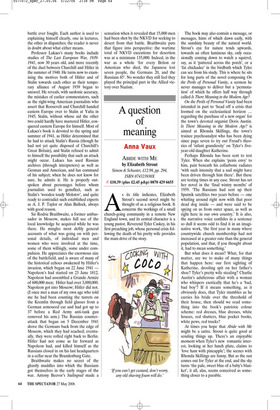A question of meaning
Anna Vaux
ABIDE WITH ME by Elizabeth Strout Simon & Schuster, £12.99, pp. 294, ISBN 074323930X ✆ £10.39 (plus £2.45 p&p) 0870 429 6655 As its title indicates, Elizabeth Strout’s second novel might be thought of as a religious book. It concerns the workings of a small church-going community in a remote New England town, and its central character is a young pastor, Reverend Tyler Caskey, in his first preaching job, whose personal crisis following the death of his pretty wife provides the main drive of the story. The book may also contain a message, or messages, hints of which dawn early, with the sunshiny beauty of the natural world. Strout’s eye for nature tends upwards, towards an often luminous sky, only occasionally coming down to watch a squirrel, say, as it ‘pattered across the porch’, or a ‘fat chickadee’ in the birdbath which Tyler can see from his study. This is where he sits for long parts of the novel composing On the Perils of Personal Vanity, a sermon he never manages to deliver but a ‘permutation’ of which he offers half way through called Is There Meaning in the Modern Age?
On the Perils of Personal Vanity had been intended in part to ‘head off a crisis that loomed on the ecclesiastical horizon ... regarding the purchase of a new organ’ for the town’s devoted organist Doris Austin. Is There Meaning in the Modern Age? is aimed at Rhonda Skillings, the town’s trainee psychoanalyst who has been dying since page seven to try out Freud’s theories of ‘infant grandiosity’ on Tyler’s fiveyear-old daughter Katherine.
Perhaps Rhonda has been sent to test Tyler. When she explains ‘penis envy’ to him, pain beneath his collarbone radiates ‘with such intensity that a nail might have been driven through him there’. But these are testing times in any case. Strout has set her novel in the ‘final wintry months’ of 1959. ‘The Russians had sent up their Sputnik satellites two years before — one whirling around right now with that poor dead dog inside — and were said to be spying on us from outer space, as well as right here in our own country.’ It is also, the narrative voice confides in a sentence so dull it seems odd to find it in an imaginative work, ‘the first year in many where countrywide church membership had not increased at a greater rate than the general population, and that, if you thought about it, had to mean something.’ But what does it mean? What, for that matter, are we to make of many things that happen here: our first sighting of Katherine, drooling spit on her father’s shoe? Tyler’s pretty wife stealing? Charlie Austin’s adulterous affair with a woman who whispers exotically that he’s a ‘bad, bad boy’? If it means something, as it obviously does, that Tyler stumbles as he carries his bride over the threshold of their house, then should we read something into the book’s patriotic colour scheme: red dresses, blue dresses, white houses, red shutters, blue pocket books, white pews, red trucks?
At times you hope that Abide with Me might be a satire. Strout is quite good at sending things up. There’s an enjoyable moment when Tyler’s new romantic interest, looking at her lunch plate, claims to ‘love ham with pineapple’; the scenes with Rhonda Skillings are funny. But as the sun comes out for Tyler at the end, and the sky turns ‘the pale, sweet blue of a baby’s blanket’, it all, alas, seems conceived as something closer to a parable.










































































































 Previous page
Previous page